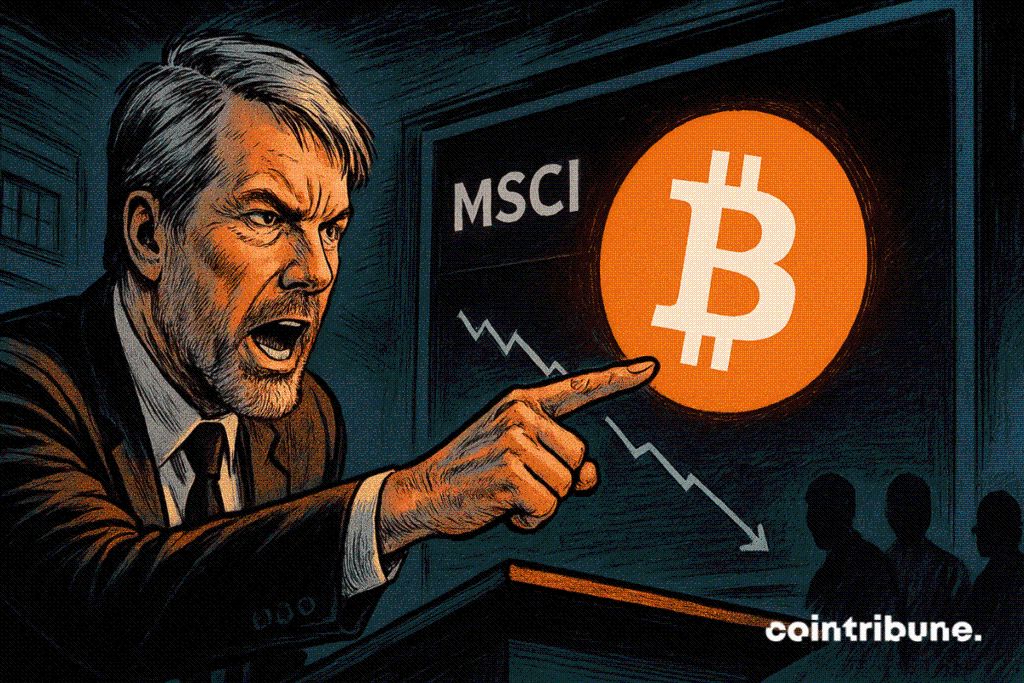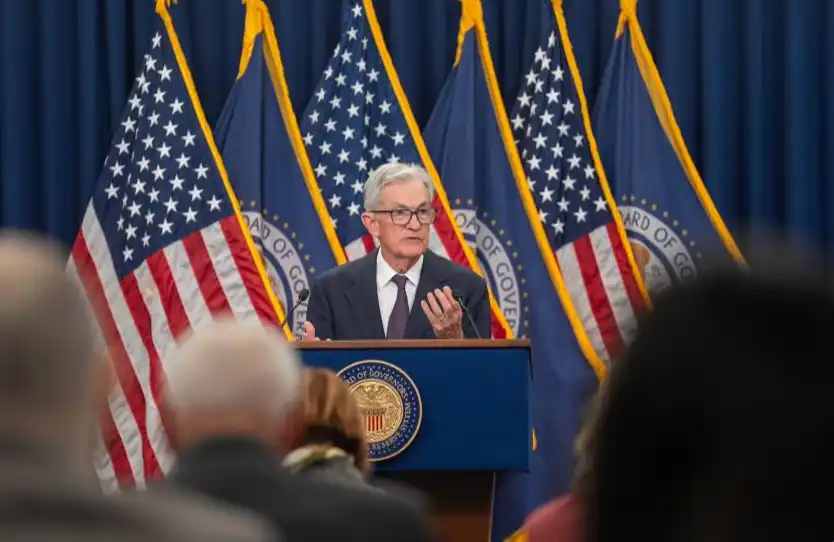Bitcoin: Michael Saylor Reacts Publicly After MSCI's Controversial Announcement
The crypto community is igniting after the announcement that Strategy and other cryptocurrency-holding companies could be excluded from major stock indices. A boycott movement is gaining momentum. Will JP Morgan be the next target of the Bitcoin revolution?

En bref
- Strategy and other crypto cash companies risk exclusion from MSCI indices as early as January 2026.
- Leading investors are publicly calling for a boycott of JP Morgan, accused of relaying this decision.
- Michael Saylor defends his company, stating that it is “neither a fund nor a trust” but a structured finance company.
- The exclusion could trigger massive automatic sales and cause cryptocurrency prices to plummet.
A Bitcoin Community in Stir
Tensions exploded Sunday when MSCI, the index company formerly known as Morgan Stanley Capital International, announced its intention to exclude companies holding more than 50% of their balance sheet in crypto.
JP Morgan relayed this information in a research note, becoming the target of bitcoiners’ anger.
Reactions were quick. Grant Cardone, real estate investor and Bitcoin advocate, hit hard. “I just withdrew 20 million dollars from Chase and I am suing them for misconduct“, he declared on social networks.
Max Keiser, another iconic figure in the ecosystem, made an even more direct call: “Take down JP Morgan and buy Strategy and BTC.“
The boycott movement is growing among a usually fragmented community. This time, the threat looms over Strategy, the world leader in institutional bitcoin holding with 649,870 BTC to its name.
The company joined the Nasdaq 100 in December 2024, allowing it to benefit from passive capital flows. Today, that position is threatened.
The stakes go far beyond Strategy’s case. MSCI index exclusion would force funds and asset managers to automatically sell their positions in these companies. A massive sell-off that could shake the entire crypto market. Analysts fear a domino effect on digital asset prices.
Michael Saylor Counterattacks Against New Rules
Strategy’s founder did not back down. On Friday, Michael Saylor published a sharp response on social media. “Strategy is neither a fund, nor a trust, nor a holding company“, he asserted.
He went on to explain that his company “creates, structures, issues, and manages,” defining it as a “structured finance company backed by bitcoin.”
This distinction is not just a semantic quarrel. It strikes at the heart of the debate: should Strategy be treated as a passive investment vehicle or as a true operating company?
For Saylor, the answer is clear. His business model relies on a strategic accumulation of Bitcoin, financed by issuing preferred shares that avoid dilution of historical shareholders.
The proposed MSCI change places these companies in a Catch-22. Either they reduce their crypto holdings below the 50% threshold to maintain eligibility for indices, or they lose access to institutional capital flows.
Some, like Bitmine, Metaplanet, or Upexi, are already seeing their net asset value ratio fall below the critical level, compromising their fundraising ability.
Yet, Strategy seems to hold strong. Despite its stock halving since its peak at $474, the company has even accelerated its bitcoin purchases . In mid-November, it acquired 8,178 BTC for $835 million. Saylor states that his company is “designed to withstand an 80 to 90% drop and keep operating.”
A Turning Point for Institutional Bitcoin Adoption
This crisis reveals a fascinating paradox. On one hand, Strategy could join the S&P 500 as soon as December according to several analysts, with a 70% probability according to 10X Research. A historic first for a Bitcoin-focused company.
On the other, index organizations seek to exclude these same companies from their traditional rankings.
Institutional finance is still hesitant. It wants to recognize Bitcoin as a legitimate asset but refuses to fully accept the companies that make it their core. JP Morgan itself is now exploring Bitcoin-backed credit.
S&P Global Ratings has even assigned a “B-” rating to Strategy, a first for this type of company. These contradictory signals illustrate a chaotic transition to a new financial paradigm where Bitcoin is gradually finding its place , without traditional players yet knowing exactly how to regulate it.
Disclaimer: The content of this article solely reflects the author's opinion and does not represent the platform in any capacity. This article is not intended to serve as a reference for making investment decisions.
You may also like
Bloomberg: As the crypto market crashes, the Trump family's and their supporters' wealth is shrinking significantly
The Trump family's wealth has shrunk by 1.1 billions US dollars, with ordinary investors becoming the biggest losers.

Why are most treasury DATs trading at a discount?
Is the DAT model truly a bridge connecting TradFi, or is it a "death spiral" for the crypto market?

Powell’s allies make a major statement: Is a December rate cut “reversal” now highly likely?
Economists point out that three of the most influential officials have formed a strong coalition in support of interest rate cuts, which will be difficult to challenge.

How We Build: Boundless Product Engineering and the Post-TGE Era
Now, thanks to the team's efforts, Boundless has become the first truly decentralized and permissionless protocol capable of handling any general-purpose ZKVM proof request.

